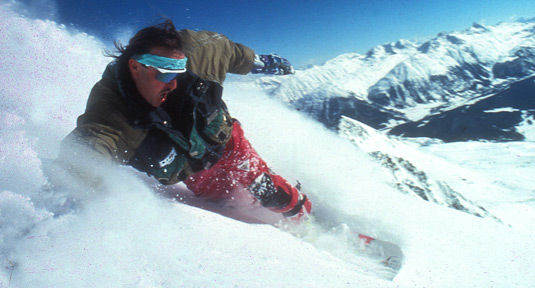Tom Sims Documentary
‘Pure Juice’ Tells Story of Skate and Snowboard Pioneer

To grow up at a certain time in Santa Barbara was to see the world changed. Most folks can be forgiven if they didn’t notice the revolution. It was, after all, just kids’ stuff, a whole lot of messing around. But what was being pioneered by young people in S.B. in the 1970s and ’80s — skateboarding, snowboarding, and new technologies of surfing, among other things — helped lay the foundations for a culture of new sports and the lifestyle with them that would become not merely global, but the dominant leisure culture of our time, worth tens of billions of dollars and continuing to define what is cool for much of the world. It’s no longer just the X Games; what Santa Barbara kids were inventing back then is now in the Olympics.
At its center was Tom Sims, a charismatic, red-headed transplant from Haddonfield, New Jersey, who moved after high school with his buddy Chuck Barfoot to S.B. to surf and ended up starting one of the most iconic companies in skateboarding history — Sims Pure Juice — making skateboards, wheels, and snowboards that pushed the limits of performance for a generation. Sims himself epitomized the lifestyle: living in a treehouse that he and Barfoot built on Mountain Drive; swooping down tree-lined Montecito lanes on slender wooden skateboards, long-haired, barefoot, and bare-chested; or carving up the Tea Bowls, a concrete stormwater detention basin at the top of Cold Springs Road. His exploits are well documented in the nascent skating media of the time, projecting an image of virile youth, physical poetry and daring, and a frank sexiness that sold the Sims brand better than even the slick urethane wheels and precisely molded boards the company was known for.
In elementary school, I cut the lawn for months to earn money to buy my first Sims dark wood Taperkick, and dreamed of Edie Robertson, a Sims team rider with sleek, long blonde hair and unimaginably smooth spins and nose rides on her board. I pasted Sims Pure Juice stickers on my lunchbox. Life was perfect in that red ellipse.
Sims and Barfoot were also early pioneers of snowboarding — incongruous in sunny Santa Barbara — but they brought the dream of surfing on snow with them from the East Coast. Sims had made his first snowboard in wood-shop class in New Jersey in 1963, and he continued experimenting, on Mount Pinos in Ventura County, until he had fiercely usable boards to bring back to the east to challenge the best there, including, notably, Jake Burton Carpenter, who was independently inventing snowboarding in Vermont. Between the two of them, they made a new relationship between people and snow. In 1985, Sims changed the game irrevocably by introducing the high-back binding.
While Sims may have been the most glamorous figure, he was one of a small crowd of innovators working in S.B. at the time, including George Powell and Stacy Peralta, whose skateboard company Powell-Peralta neighbored the Sims shop on Milpas Street; Al Merrick of Channel Islands Surfboards on lower State Street (whose young team rider, Tom Curren, whom I went to elementary school with, rode Merrick’s multi-fin short boards to three world championships, in 1985, ’86, and ’90); and George Greenough, the visionary photographer and technologist, who was building space-age, vacuum-molded, carbon-and-aluminum honeycomb surf- and sail-craft in his parents’ Montecito garage — designs that remain ahead of the curve decades later.
Santa Barbara wasn’t the only place this creative ferment was going on, but its concentrated intensity made it a unique incubator of the surf-skate revolution that has echoed across the world, from Ireland to Taiwan. And Tom Sims was perhaps the most the charismatic innovator at the heart of the scene.
In the offing is a new documentary titled Pure Juice by Scott Clum — who met Sims in 1981 and became first a team rider and then design director of the company — and his collaborators, Eric Jeffcoat and Erich Lyttle. The filmmakers are looking for support and raising funds privately. Interested parties can contact Clum directly at 1avocadofilms@gmail.com.



